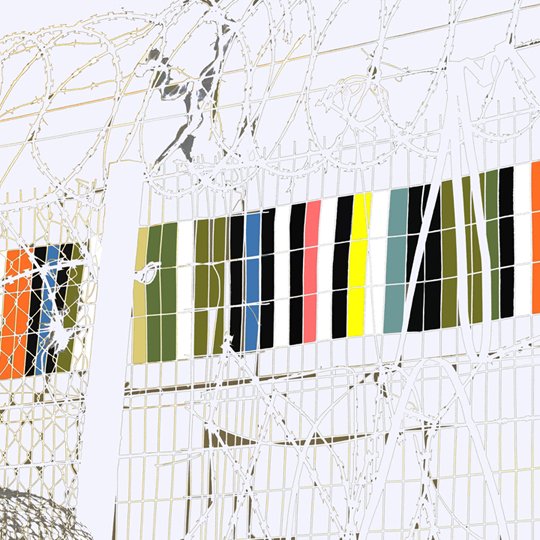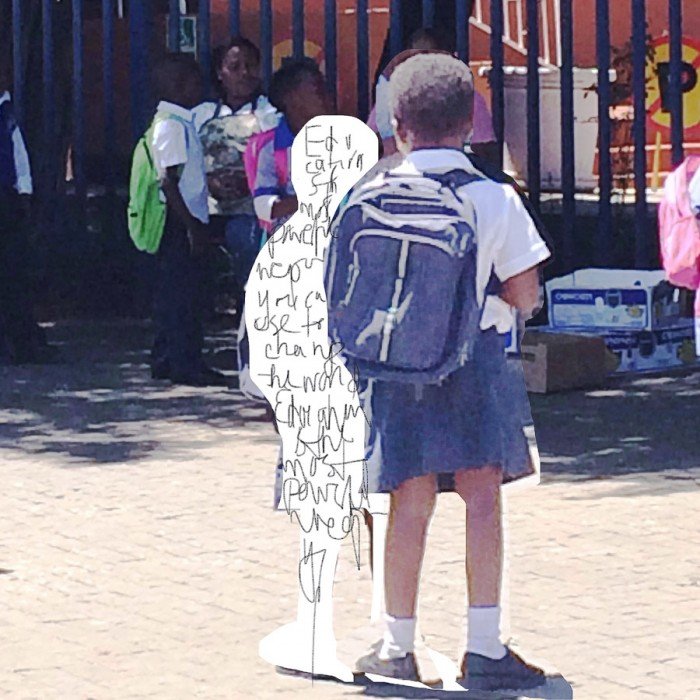P R E S S / E V E N T S
Crafting Strong Messages
By Cate McQuiad, Boston Globe
…Barbed wire speaks to South Africa’s history of apartheid and violence, but the images have plenty of resonance here, and anywhere fences are built to keep people out — or in. Read More
‘Barbed’: A South African artist confronts the post-Apartheid world
Bay State Banner, February 25, 2016
“Yellow Flower” is a striking composition on a smoke grey background. Buttercup yellow blossoms wind diagonally down the canvas, wrapped around brown vines. Blooming from the other end of the rectangular image are spirals of grey wire, their usual harsh angles muted by a computer-generated softness. The composition is beautiful, a perfect symmetry of the natural and the man made. But with time, the image becomes unsettling. The inviting flowers are overshadowed by the violent undertones of the wire. Read more
Barbed
Mayor’s Neighborhood Gallery 2nd floor, Boston City Hall January 1 – February 24
This extensive collection of new work explores through photographs, mixed media and works on paper. Jocelyn’s response to South Africa: looking back, today, and into the future. The exhibit is now on display on the 2nd floor of Boston City Hall in the Mayor’s Neighborhood Gallery. View the gallery Monday-Friday from 9-5. If you would like a small group showing, contact Jocelyn. A reception will be held in February in honor of Black History Month. Details to follow.
Tune into the video to hear Jocelyn talk about the work she currently has on display at Boston City Hall.
Boston City Paper, December 21, 2015
Art New England Magazine
A Conversation with Jocelyn Chemel, January 22, 2016
Jocelyn Chemel. School Girl. 2013. Digital photograph mounted on wood panel, resin. 12×12″. The text in the photograph is Nelson Mandela’s quote “Education is the most powerful weapon you can use to change the world”.
Jocelyn Chemel is fixated by life’s contrasts, and now she can finally speak out about them. Growing up under apartheid in South Africa, Chemel remembers that “we were all prisoners of fear.” Unable to speak freely over the phone for constant fear of arrest, Chemel left South Africa when she was 20 and is now a mixed-media artist based out of Boston. Over the intervening years, she has returned to her native country on several trips and observed it post-apartheid, but her hopes for the future are still tinged with uncertainty. Barbed, Chemel’s exhibition currently on view in Boston City Hall, explores that duality of hope and anxiety.
Following Nelson Mandela’s death in 2013, Chemel noted that a groundswell of celebration for Mandela’s legacy pervaded life in South Africa. “Mandela did the unthinkable by preventing civil war. We grew up always having our bags packed, because no one knew what might happen.” In appreciation, grateful South Africans left memorial stones painted with messages of thanks and hope outside of Mandela’s home, where Chemel took photographs that are a part of the exhibit. During this same trip, Chemel also photographed schoolchildren in Soweto, near Johannesburg. She was caught by “the contrast between these children’s pristine clothing and shoddy education.” Chemel fears that Mandela’s mission to better education is being lost under the current political climate. Her piece Schoolgirl is an altered photograph, in which a young schoolgirl is paired with “a ghost tribute to those who don’t get educated.” In a personal effort to bring the tools of creativity to those in need, Chemel has distributed art supplies to South African children in a project she calls “Art on a Mission.”
Jocelyn Chemel. Shhh. Mixed media drawing on paper, ink stamp, tape, thread. 24×36″.
Chemel’s working method is almost like a dialog, in which the handcrafted is interlaid with digital manipulation. There is a poetic justice to this; much of her work celebrates famous quotes by Mandela while also suggesting a culture of silence. “South Africa,” says Chemel, “is a country of covering up.” Barbed Pearl highlights the veneer that coats an ugly truth: coils of razor wire are covered in bright nail polish and pearls. In another powerful piece, entitled, Shhh, the sibilant word is echoed across the surface, colliding with blood red lines that mark out sections of text. The viewer is asked to literally find a “voice,” that single word floating on the peripheries of censorship.
Jocelyn Chemel. Yellow flower. 2014. Digital photograph mounted on wood panel, resin. 16×16″.
At her artist’s talk, Chemel walks from piece to piece in Barbed, elaborating on the profound importance of Mandela’s legacy for her work and for South Africa. She knits her personal memories together with the recent history and uncertain future of her country, looping the pain and hope of a particular place together like the coils of barbed wire and bursts of bright yellow flowers in Yellow Flower. Yet, Chemel insists that there is “something universal” in her tribute to Mandela that goes beyond South Africa. “I hope the world takes that consciousness [of Mandela’s message] into the future to solve problems like refugees, like militarization, and turn it into a conversation.” Looking at Yellow Flower, she sighs. “There is hope. You can see it here—nature prevails.”
Barbed is on view at the Mayor’s Neighborhood Gallery on the second floor of Boston City Hall through February 28.
By Olivia J. Kiers
Motherbrook Open Studios
Jocelyn presented her work on November 14 and 15 at Mother Brook Open Studios in Dedham. This was a juried showcase of over 40 artists from around New England.





